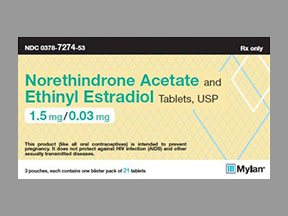Hailey 1.5/30 is a limited distribution medication.

Hailey 1.5/30 Coupons & Savings Card – Discount Prices from $13.40
Brand for: Norethindrone acet-ethinyl est
My prescription
Edit
1.5-30MG-MCG, Norethindrone Acet-ethinyl Est (21 Tablets)
Select pharmacy

CVS
$20.91
COUPON PRICE
Walmart
$13.40
COUPON PRICE
Walgreens
$13.53
COUPON PRICE
Albertsons
$14.06
COUPON PRICEHailey 1.5/30 savings card
Show this card to your pharmacist
Walmart
$13.40
BIN
ID
PCN
GRP
019876
LHFE414CE2
CHIPPO
LHX
Powered by
Price history for Hailey 1.5/30 (brand) & Norethindrone Acet-ethinyl Est (generic)
21 Tablets, 1.5-30MG-MCG
Average retail price for Hailey 1.5/30
Average retail price for Norethindrone Acet-ethinyl Est
Average SaveHealth price for Norethindrone Acet-ethinyl Est
Our price history data is based on aggregated prescription data collected from participating pharmacies in America. Our prescription data updates daily to reflect the latest price changes. If you notice a missing data point, it means there wasn't sufficient data available to generate a monetary value for that date.
Over the last 12 months, the average discount price of Hailey 1.5/30 is $18.63 using the SaveHealth savings card. That's an average savings of 61.93% on Hailey 1.5/30 with our discount card.
*Retail prices are based on pharmacy claims data, and may not be accurate when we don't have enough claims.
Hailey 1.5/30 (Norethindrone Acet-ethinyl Est) dosage forms
Dosage Quantity Price from Per unit 1.5-30MG-MCG 21 Tablets $13.40 $0.64 1.5-30MG-MCG 63 Tablets $26.13 $0.41
| Dosage | Quantity | Price from | Per unit |
|---|---|---|---|
| 1.5-30MG-MCG | 21 Tablets | $13.40 | $0.64 |
| 1.5-30MG-MCG | 63 Tablets | $26.13 | $0.41 |
What is Hailey FE 1.5 30 used for?
Hailey FE 1.5/30 is a combination oral contraceptive pill used to prevent pregnancy. It contains two hormones, norethindrone (a progestin) and ethinyl estradiol (an estrogen), which work together to inhibit ovulation, alter the cervical mucus, and change the uterine lining to prevent fertilization and implantation. Additionally, it may be prescribed to regulate menstrual cycles, reduce menstrual cramps, and manage acne in some cases.
Can Hailey 1.5/30 cause side effects?
Yes, Hailey 1.5/30, like other oral contraceptives, can cause side effects. Common side effects may include nausea, headache, breast tenderness, weight changes, and mood changes. Some individuals may also experience changes in menstrual flow or spotting between periods. It's important to consult a healthcare provider if any side effects are severe or persistent.
Does Hailey Fe birth control cause weight gain?
Weight gain is a potential side effect of Hailey Fe birth control, as it is with many hormonal contraceptives. However, not everyone will experience this side effect, and any weight changes can vary from person to person. If there are concerns about weight gain or other side effects, it is advisable to consult with a healthcare provider.
Is Hailey Fe 1.5/30 a combination pill?
Yes, Hailey Fe 1.5/30 is a combination oral contraceptive pill. It contains both estrogen and progestin, specifically ethinyl estradiol and norethindrone acetate, along with ferrous fumarate as an inactive ingredient.
